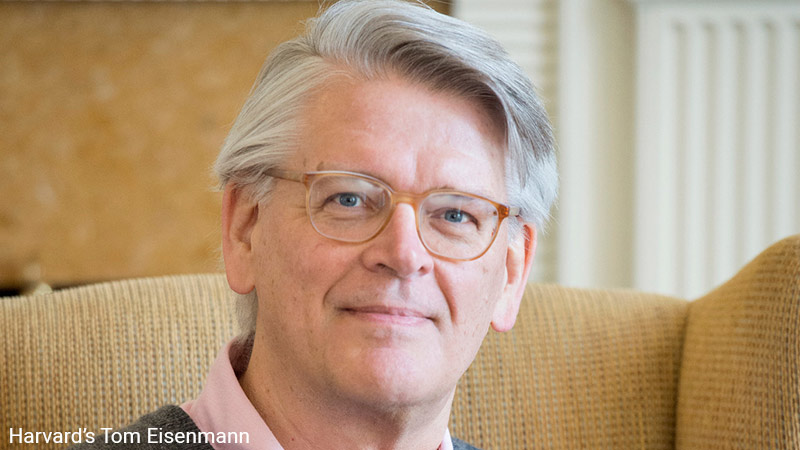Harvard's Tom Eisenmann Reveals the Real Reasons Startups Fail
Tom Eisenmann writes in the newly-published “Why Startups Fail: A New Roadmap for Entrepreneurial Success” (Currency) that when two startups of his former students failed a few years ago, he realized that he couldn't point to a primary root cause. He thought he had taught them the perfect playbook: they were smart, had seemingly great ideas, and had enthusiastic investors. For that matter, it wasn't clear why a majority of such efforts don't end well (he defines an entrepreneur as someone "pursuing a novel opportunity while lacking resources," as opposed to just any small business owner, which means one could be entrepreneurial within a large company).
As the Harvard Business School's co-chair of the Arthur Rock Center for Entrepreneurship and having taught the Entrepreneurial Manager course required of all first-year MBAs for over two decades, he thought he should know more about why so many startups are not successful. Yet all the experts had failed to do the thorough research needed to pin down the reasons. Eisenmann discovered that the facts are often at odds with what founders and investors want to believe, and he corrects the record in 350 well-documented pages.
"Part of the problem in seeing things clearly is that the causes of failure are always complicated, but humans are wired to oversimplify explanations," Eisenmann told Startup Savant. "When we observe others, we tend to overemphasize dispositional factors, like personality and the values we assume they have, while downplaying situational factors, such as social pressures or environmental circumstances. But when we explain our own behaviors, we attribute good outcomes to our diligence or skill and bad outcomes to situational ones. As a result, first- and third-party explanations for startup failures are often not reliable."

Eisenmann's Journey
Eisenmann grew up in Cleveland, where the paperboy job he started at 10 was a real challenge in summer and winter. "But I learned that you don't get an order without asking and I grew my route from 28 to 38 by selling," he recalled.
After earning a B.A. at Harvard University in 1979, he joined Booz Allen as a consultant, then returned to get his MBA in 1983. He went back to consulting for 11 years— this time at McKinsey, where he focused on media and entertainment at a time when cable TV, telecom, and the nascent Internet were converging.
"At age 37, for my mid-life crisis, I decided to get a doctorate instead of a sports car. I wanted to study strategic decision-making in giant cable TV companies, most of which were still run by their founders. It took me a while to realize I was actually studying entrepreneurs."
He earned his doctorate in Business Administration in 1998 and began teaching at Harvard Business School, eventually specializing in entrepreneurship.
His passion is creating programs and courses that he can hand off to other professors after a couple of years. These have included Product Management 101, Entrepreneurial Sales & Marketing, and Startup Bootcamp.
"We’ve long had joint programs that combine an MBA with another school’s degree," he said. "For example, our MD/MBA would equip a physician to run a medical practice in a more business-like way, become an executive at a hospital chain, or a venture capitalist who has deep expertise in life sciences. I’m proud to have helped create a new joint program that combines an MBA with a Master’s of Science degree from Harvard’s Engineering School. And, I’m excited that more than half the students we are admitting to that program this year are female."
He noted that VC firms are recruiting more women and minorities to join them and investing in a more diverse group of entrepreneurs. Business schools are also working hard to reach out to underrepresented groups.
HBS has an impressive record of creating entrepreneurs, with alumni founding 1,300 venture capital-backed startups since 2006. Eisenmann hasn’t tracked their success rate but assumes that it probably matches that of other VC-backed startups. He also noted that "probably half of all angel-funded startups that raise at least $500,000 are not able to get to the typical VC series A round of $3-$5 million."
Major Factors in Early-Stage Failures
When startups fail, Eisenmann says there is another tendency among investors to blame the "jockeys," that is, the founders, who they believe didn't have the skills to overcome the challenges. Founders, on the other hand, often blame others—say, an investor who pushed for the wrong strategy — or factors outside their control, such as a rival’s irrational move or a surprise shift in regulation. Eisenmann says that debates about who’s to blame aren’t helpful because failure is usually due to a complex mix of factors.
It doesn't help that common advice to early-stage entrepreneurs when they face major challenges is often counter-productive, he asserts:
- Just Do It! "Great entrepreneurs have a bias for action and being decisive and nimble is one of the few advantages that an entrepreneur has, yet it may tempt you to cut short research to find the right answer to a problem and you lock yourself into a flawed solution."
- Be Persistent! "Entrepreneurs need to be persistent, but this can turn into stubbornness and you may be reluctant to pivot when it should be clear that your solution isn't working well."
- Bring Passion! "Passion can power an entrepreneur through the most daunting challenges, but in the extreme, it can translate into overconfidence that results in shortcuts and ignores warning signs."
- Grow! "The constant pressure to grow may tempt you to prematurely launch your product before you have done adequate research."
- Focus! "Excessive focus comes with risks. For example, if you concentrate all your efforts on a single consumer segment, your logical target will be early adopters, ignoring the needs of mainstream customers."
- Be Scrappy! "Entrepreneurs must conserve resources, so if your team lacks skills and the best candidates demand high compensation, a founder might just say, 'We'll have to do without them.'"
"Prior industry experience improves the odds of entrepreneurial success, but does not ensure it, so founders always need to work hard to anticipate and avoid common failure patterns," he noted.
Likewise, he found that some common ways to minimize risk with early-stage ventures can backfire: some entrepreneurs launch “minimum viable products” (MVPs) without doing enough upfront research to confirm they’ve found strong, unmet customer needs; they find that strategic partners are reluctant to provide critical resources for something unproven; and they stage financing, aiming to raise more funds after they’ve met key milestones — but find that they run out of capital when they encounter unexpected challenges.
The viability of a startup greatly depends on a strongly differentiated "customer value proposition," factoring in an innovative offer and the potential for it becoming increasingly valuable against the cost (including inconveniences) of switching from what they currently use. Common errors are not fully recognizing the strengths of a competitive product and not creating a prototype that gets a real-world test (the "MVP").
Finally, entrepreneurs leading early-stage startups must focus on their unit economics, that is, the cash profit they earn from a typical transaction. They also must ensure that the lifetime value of a customer exceeds the cost to acquire a customer.
Scaling Wisely
It's easy to think a venture can push the pedal to the floor when it survives the inevitable early crises and has a successful launch. But scaling requires structure along with new skills and resources. The factors behind a venture’s early growth cannot guarantee continued success.
Expansion can derail due to what Eisenmann calls the Speed Trap. Hypergrowth can attract new rivals, result in unexpected market saturation, and reveal inadequacies in leadership. A larger workforce requires structure and processes which conflict with the entrepreneurial spirit of the startup’s early culture.
There is almost inevitably a challenge trying to recruit the needed specialists for this next level. The most qualified may be expensive and, if they come from big companies, unaccustomed to the chaotic rhythms of a startup.
"The head of human resources plays a crucial role in organizational design, which includes reconfiguring reporting relationships as new positions are created," said Eisenmann. "She will also advise the CEO on how to strengthen the company's culture and counsel other senior executives to augment their skills and adapt their management style to the new challenges."
He says that startup leaders can cushion their risk by raising more capital than the projections show they will need, find VCs who are able to provide bridge financing, should a lifeline be needed, and have a plan for cutting costs, if a trade-off is required.
But too often, entrepreneurs and their financiers put themselves in a position where their success depends on "moonshots," a cascading series of miracles.
Failure can be avoided, and Eisenmann provides the ultimate handbook on how. Surprisingly, his research shows that half of a sample of founders who closed their startup in 2015 eventually recovered emotionally and finally enough and learned sufficient lessons that they went on to found another company within five years.
"I think the pandemic will have a positive impact on startups that will surprise most people," Eisenmann said. "It has given a supercharge jolt to those who are able to stream new products and services and make it easier to buy almost anything online. But entrepreneurs are also creating revolutionary new tools to collaborate and manage projects remotely, which will allow new startup hubs outside the biggest cities to thrive, drawing on a workforce that can live and work anywhere."
About the Author

Scott S. Smith has had over 2,000 articles and interviews published in nearly 200 media, including Los Angeles Magazine, American Airlines’ American Way, and Investor’s Business Daily. His interview subjects have included Bill Gates, Richard Branson, Meg Whitman, Reed Hastings, Howard Schultz, Larry Ellison, Kathy Ireland, and Quincy Jones.
Startup Resources
- Learn more about Startups
- Visit the TRUiC Business Name Generator
- Check out the TRUiC Logo Maker
- Read our Business Formation Services Review
- Find Startup Ideas
- Explore Business Resources
Form Your Startup
Ready to formally establish your startup? Click below to read our review of the best business formation services!
Best Business Formation Services